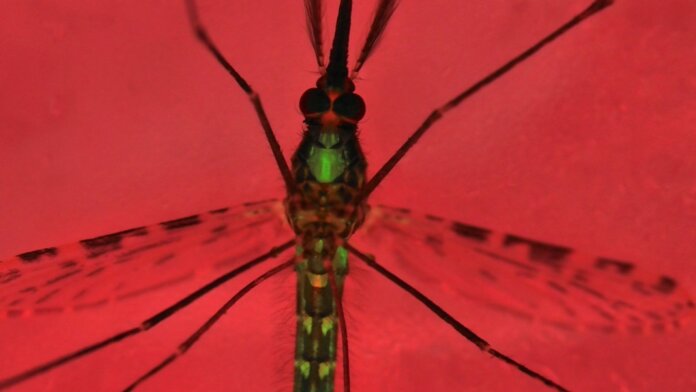Though at least one vaccine for malaria is in use, it remains one of the deadliest diseases in the world. Almost half of the world’s population lives in areas where malaria transmission occurs, and an estimated 619,000 people died of the disease in 2021. Worse yet, the vast majority of cases leading to death are in young children.
Researchers from the University of California in San Diego may have found a way to reduce this burden of disease. They used the gene editing tool CRISPR to alter a gene that controls sexual development in mosquitoes. Male mosquitoes don’t bite humans; it’s the females that spread malaria and other diseases. The UCSD team’s method uses gene editing to kill all female mosquito offspring within a given population of the insects.
The mosquito species in question is Anopheles gambiae, commonly called the African malaria mosquito and described as “the most efficient vector of human malaria.” They’re anthropophilic, meaning they like human blood more than animal blood, and they thrive in hot climates with a lot of moisture. Why such an insect exists in the first place is hard to comprehend, is it not?
But there’s hope. In a paper published last week in Science Advances, the researchers described a method dubbed Ifegenia. The word is an acronym for “inherited female elimination by genetically encoded nucleases to interrupt alleles.” The team noted they chose the name in honor of a character from Greek mythology: Iphigenia was sacrificed by her father, King Agamemnon, in order to win a battle.
The Ifegenia system targets a gene called femaleless, or fle. It works by genetically encoding a Cas9 nuclease (the “molecular scissors” CRISPR uses to cut a strand of DNA) in one mosquito family and a guide RNA in another family. When mosquitoes from the two different families mate, their offspring end up with mutations to the fle gene that cause all female larvae to die.
The males, meanwhile, not only live, they carry and spread Ifegenia; that means any female they impregnate will only have male offspring—which will also carry and spread the genetic edit to keep preventing disease-spreading females from being born.
Within a given population, it’s only a matter of time until there’s no females left—and thus no way to spread malaria. Since its Cas9 and guide RNA components are separate until mating occurs, Ifegenia isn’t likely to be hindered by genetic resistance and other issues common in gene drive technology.
“Ifegenia can achieve robust temporary population suppression over a wide range of release parameter values, permitting rebound of native populations after ceasing releases,” the researchers wrote. It seems like once you get rid of the pests there’d be no reason to bring them back, but the authors note it may make sense to do so in areas where their system eliminates malaria but there are “ecological concerns” about completely stamping out the insect.
As a lifelong mosquito magnet, I’m all for eradicating the evil-doers from the face of the Earth. But also, getting rid of a species—even a universally detested one—could have impacts we’re not aware of, both in the present and further down the road. As Homer Simpson’s father put it, “don’t step on anything, because even the tiniest change can alter the future in ways you can’t imagine.”
One change we could use right now, though, is reducing the number of people who suffer and die from malaria. 96 percent of the world’s malaria deaths occur in Africa, and more than half of them are concentrated in just four countries: Nigeria, the Democratic Republic of Congo, Tanzania, and Niger. If Ifegenia were employed in mosquito-dense parts of these countries, it could make a substantial difference in public health.
“This technology has the potential to be the safe, controllable, and scalable solution the world urgently needs to eliminate malaria once and for all,” said paper author Omar Akbari. “Now we need to transition our efforts to seek social acceptance, regulatory use authorizations, and funding opportunities to put this system to its ultimate test of suppressing wild malaria-transmitting mosquito populations. We are on the cusp of making a major impact in the world and won’t stop until that’s achieved.”
Image Credit: Akbari Lab, UC San Diego



